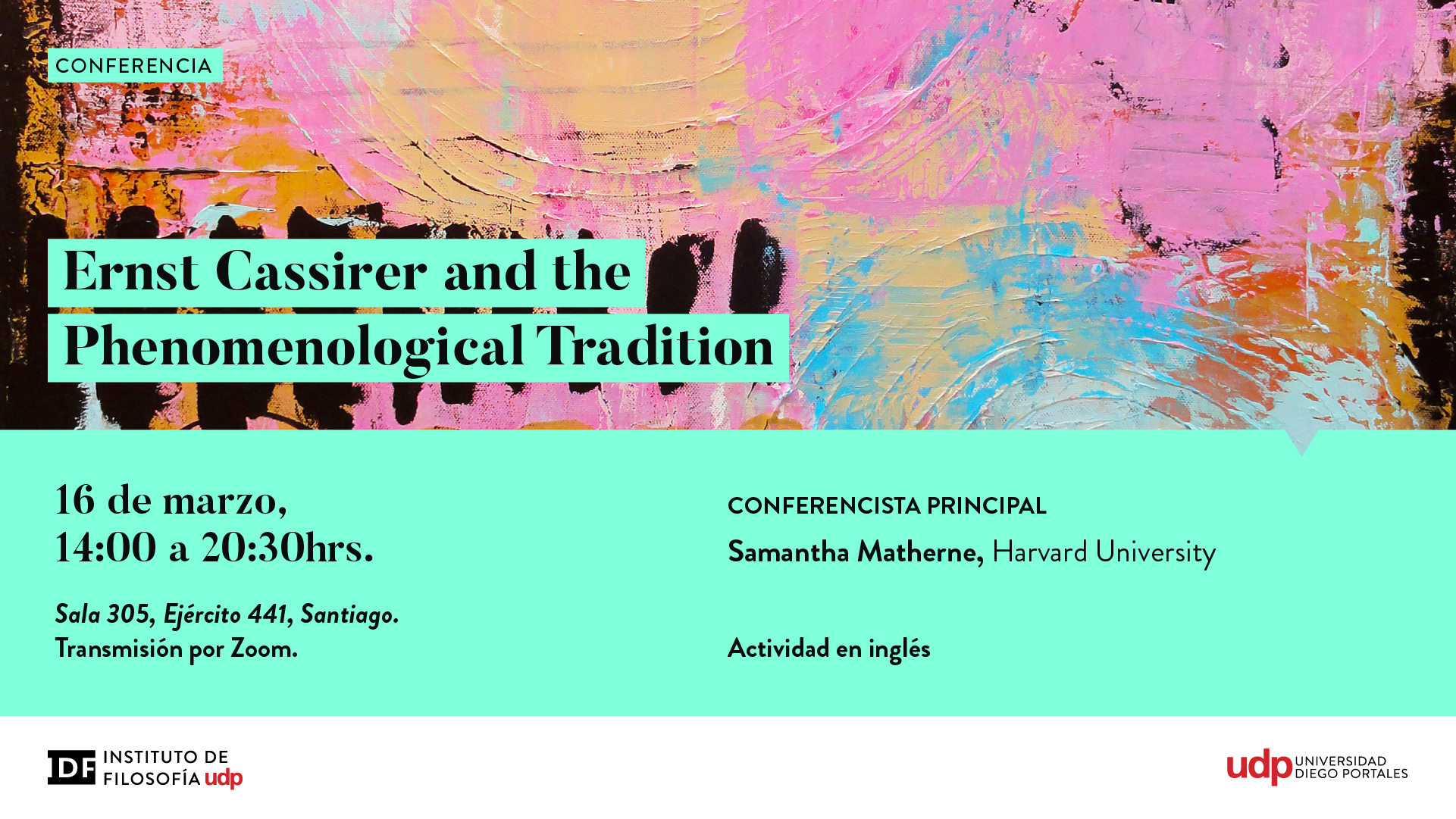Noticias

Este jueves 16 de marzo se llevará a cabo el Coloquio «Ernst Cassirer ans The Phenomenological Tradition» en el que participarán los profesores Jacinto Páez, Hernán Pringe y Ovidiu Stanciu, de la Universidad Diego Portales, junto a los invitados internacionales Rafael García, Lucas Amaral y Samantha Matherne. La profesora Samantha Matherne será la conferencista principal, quien también estará a cargo de abrir la jornada del jueves.
Samantha Matherne (Harvard University) trabaja principalmente sobre Immanuel Kant, las tradiciones postkantianas (especialmente la fenomenología y el neokantianismo) y la estética. Le interesan las relaciones entre percepción, cognición y estética, así como el papel omnipresente que desempeña la imaginación en la vida. Actualmente trabaja en una interpretación sistemática de la teoría de la imaginación de Kant, cuyo título provisional es Seeing More: Kant’s Theory of Imagination. También estudia la obra olvidada de la filósofa alemana de principios del siglo XX Edith Landmann-Kalischer, editando actualmente la primera traducción al inglés de su obra, traducida por Daniel Dahlstrom, la cual aparecerá en la Oxford New Histories of Philosophy Series.
El Coloquio «Ernst Cassirer and The Phenomenological Tradition» se llevará a acabo completamente en inglés y tendrá modalidad híbrida. Para quienes deseen asistir de forma online, pueden inscribirse en el siguiente link de Zoom.
Programa Coloquio «Ernst Cassirer and The Phenomenological Tradition»
The relation between Neo-Kantianism and Phenomenology, understood as alternative versions of transcendental philosophy, constitutes one of the central topics of contemporary debate. In this context, the confrontation between Ernst Cassirer’s philosophical project and the phenomenological tradition has yet to be comprehensively explored. The recent trends in the literature emphasize the points of contact between Cassirer’s and Husserl’s philosophical positions. The two philosophers share several guiding commitments in the field of theoretical philosophy. They present similar strategies of appropriation of the Kantian tradition, advocating for the autonomy of logic and rejecting the empiricist theory of abstraction. The same productive relationship can be discerned between Cassirer and other representatives of the phenomenological tradition, such as Merleau-Ponty who takes up and applies to new contexts Cassirer’s notion of “symbolische Prägnanz”. Moreover, it can be argued that the criticism Cassirer formulated against Husserl overlaps with the ones voiced by Heidegger, Merleau-Ponty, or Derrida. On a more promising note, it has also been suggested that the possibility of complementing the Neo-Kantian critical method with a specifically phenomenological one is already set in place in Cassirer’s mature philosophy.
Nevertheless, whenever Cassirer describes his enterprise as a phenomenology, he is eager to stress that this should be understood in a Hegelian and not a Husserlian sense. Cassirer’s dialogue with the other leading exponent of the phenomenological tradition at the beginning of the twentieth century did not contribute to the search for a constructive relation either. For his debate with Martin Heidegger rather than setting the scene for a fruitful collaboration was interpreted as a philosophical, generational, and political clash. In addition, there are systematic problems specific to the unique languages and methods used by these philosophers. The aim of this conference is to engage a reflection on the cluster of problems revolving around the multifaceted relation between Cassirer and Phenomenology.
Conferencias:
14.00-15.45
Samantha Matherne (Harvard University), Cassirer and the Phenomenology of Aesthetic Contemplation
Jacinto Páez Bonifaci (UDP), The Rythm of Becoming: On Cassirer’s the Metaphysics of Symbolic Forms
16.15-18.00
Ovidiu Stanciu (UDP), Making sense of the mythical World. Cassirer and Heidegger
Rafael García (Universidad Estadual de Campinas), «Back to Davos: another continental divide»
18.30-20.15
Hernán Pringe (UDP), Cassirer and the Kantian Thing-in-Itself
Lucas Amaral (Pontificia Universidad Catolica de Sao Paulo), Should we insist on Neo-Kantianism when talking about mathematics? Remarks on Cassirer’s case